14 Jun 2018 | Events
[vc_row][vc_column][vc_column_text]
What is hate speech? What is behind the rise of hate-speech legislation and codes? Are some words and ideas just too hateful for public life? Is policing hate speech the best way to protect equality and freedom — or is free speech, more speech, the answer?
Join Index on Censorship, LSE Law, LSE Human Rights and spiked for this free panel, Q&A and book signing, to mark the publication of Nadine Strossen’s new book.
[/vc_column_text][/vc_column][/vc_row][vc_row][vc_column][vc_custom_heading text=”Speakers” font_container=”tag:h3|text_align:left” use_theme_fonts=”yes”][vc_row_inner][vc_column_inner width=”1/4″][vc_single_image image=”100809″ img_size=”full” add_caption=”yes”][/vc_column_inner][vc_column_inner width=”1/4″][vc_single_image image=”100810″ img_size=”full” add_caption=”yes”][/vc_column_inner][vc_column_inner width=”1/4″][vc_single_image image=”100808″ img_size=”full” add_caption=”yes”][/vc_column_inner][vc_column_inner width=”1/4″][vc_single_image image=”100807″ img_size=”full” add_caption=”yes”][/vc_column_inner][/vc_row_inner][vc_column_text]
SPEAKERS:
Nadine Strossen is the author of numerous books. Her latest, HATE: Why We Should Resist it With Free Speech, Not Censorship, is out now. Nadine was the first woman national president of the American Civil Liberties Union (ACLU), serving from 1991 to 2008. She is professor of constitutional law at the New York Law School and is a frequent speaker on constitutional and civil-liberties issues.
Jodie Ginsberg is the head of UK-based freedom of expression organisation Index on Censorship. A former foreign correspondent and business journalist, Jodie worked for more than a decade for the Reuters news agency and was Reuters’ London Bureau chief. She has also worked as head of communications for Camfed, an international charity, and as an editor at Chime for Change. Follow her on Twitter: @jodieginsberg
Joanna Williams is an author, academic and the associate editor of the online magazine spiked. Her latest book is Women Versus Feminism: Why We All Need Liberating from the Gender Wars. Joanna taught in schools, and further and higher education, for over 20 years, most recently as director of the University of Kent’s Centre for the Study of Higher Education. She writes regularly for numerous other publications. Follow her on Twitter: @jowilliams293
CHAIR: Peter Ramsay is professor of law at LSE. His research interests include: the theoretical connections between criminal law, democracy and civil liberty; the protection of security interests by criminal law; the construction of the vulnerable legal subject. See more here.
This is a free panel and Q&A, which will be followed by a book signing with Nadine Strossen.
[/vc_column_text][/vc_column][/vc_row][vc_row][vc_column][vc_column_text]
When: Monday 2 July 2018, 18:30 – 20:00 BST
Where: London School of Economics, New Academic Building, Alumni theatre, Houghton Street, WC2A 2AE (Directions)
Tickets: Free. Registration required via Eventbrite.
[/vc_column_text][/vc_column][/vc_row]
11 Jun 2018 | Awards, Fellowship, Fellowship 2018, Honduras, News and features
[vc_row][vc_column][vc_single_image image=”100749″ img_size=”full”][vc_column_text]Two days after the publication of an investigation into alleged inappropriate behaviour by a member of a Honduran military unit involving young female students, digital newspaper Reportero de Investigacion was targeted with a misleading story that purported to be from the outlet.
The news outlet, which was founded by 2018 Freedom of Expression Awards Fellowship winner Wendy Funes, had posted an 8 June 2018 article which exposed how members of a military unit were going into schools, teaching children without parental consent or notification, collecting personal information and, in at least one case, texting sexually harassing messages under the guise of the “No Drugs, Live Better” programme. The Reportero de Investigacion article included screenshots of a text conversation between a mother and a military officer. The officer thought they were texting the woman’s daughter.
The publication drew a large amount of the attention in Honduras, which is one of the world’s most dangerous places to be a journalist.
Two days later, a faked article began appearing that used the Reportero de Investigacion logo and included screenshots from gang members who discussed the difficulties of distributing drugs, claiming they had less access after the military had begun its in-school training programme. The false article is being shared on WhatsApp groups among members of the law enforcement community in Honduras, Funes told Index on Censorship.
This is not the first time that fake news stories have been circulated in Honduras to discredit the work of investigative journalists and human rights activists and undermine their personal security.
For Funes, it is vital that the appropriate government agencies investigate these false publications. She said she will be addressing a complaint to the new Honduran Special Prosecutor for the Protection of Human Rights Defenders, Journalists, Social Communicators and Justice Operators, (FEPRODDHH), which has the responsibility for determining where the faked article purporting to be from reporterosdeinvestigación.com came from.
“For us it is necessary to carry out an investigation, although we do not have the certainty that it is a smear campaign against our newspaper, we believe that an investigation is urgent to determine the origin of the messages and the State has the tools necessary to do it.” Funes said.
Perla Hinojosa, fellowships and advocacy officer at Index on Censorship said: “It’s important to call out efforts to discredit the investigative work of journalists like Wendy. Even though this was not a direct physical threat, the spread of false information undermines Wendy’s news organisation, which seeks justice and identifies human rights abuses.”[/vc_column_text][/vc_column][/vc_row][vc_row][vc_column][vc_basic_grid post_type=”post” max_items=”12″ style=”load-more” items_per_page=”4″ element_width=”6″ grid_id=”vc_gid:1528734389898-5507b00f-068d-2″ taxonomies=”23255″][/vc_column][/vc_row]
8 Jun 2018 | Americas, Artistic Freedom, Awards, Cuba, Fellowship, Fellowship 2018, News and features
[vc_row][vc_column][vc_column_text]
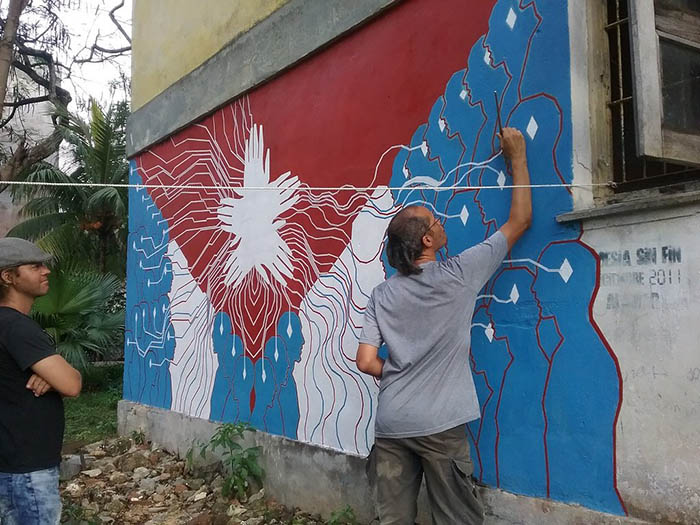
Cuban artist Yasser Castellanos
Despite official efforts to stop it in its tracks, Cuba saw the successful completion of its first independent art biennial, organised without the support of the state, on 15 May. Artist Luis Manuel Otero Alcantara and curator Yanelys Nuñez Leyva, members of the Museum of Dissidence, winner of the 2018 Index on Censorship Freedom of Expression Award for art, organised the ten-day #00Bienal de la Habana, which included over 170 artists, writers, musicians and theorists across nine different exhibitions in artists’ homes and studios around the country’s capital.
“Cuban culture is centralised culture and the government has absolute control,” Nuñez Leyva tells Index on Censorship. “The Ministry of Culture, together with all its branches such as the Union of Writers and Artists of Cuba and the National Council of Plastic Arts, are tentacles of the Ministry of the Interior, so all independent proposals, whether cultural, ecological or campaigns against gender violence, for example, are cursed with all the might of the government-controlled media.”
Even at schools pupils are served up propaganda intent on turning them against non-state-approved artists. Some art school students were shown a video portraying Otero Alcantara as a mercenary. “Such a campaign inevitably generates fear around independent projects which then suffer due to lack of both social and economic support,” Nuñez Leyva says.
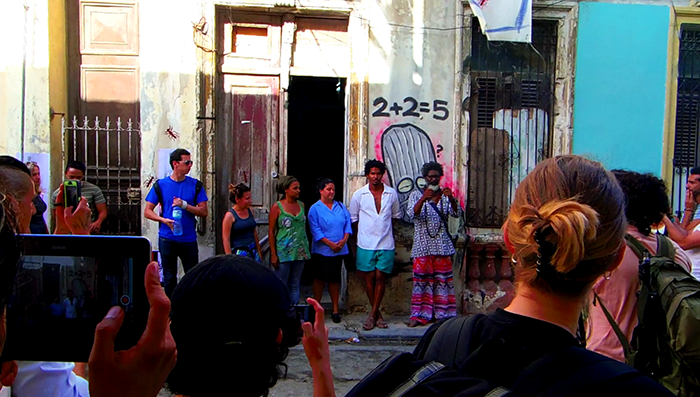
Economic support was one of the biggest obstacles for #00Bienal. “At the beginning, we thought that we would produce it with what we had at hand, but along the way we realised that we needed more,” Nuñez Leyva says. So a Gofundme campaign was set up, which raised $6,574. “But this wasn’t easy: the impact of the US blockade, our isolation from the world of networks and the impossibility of having credit cards made the process anguishing.”
Otero Alcantara was also imprisoned without cause on several occasions as part of the Cuban government’s campaign of harassment. Others who took part in #00Bienal, whether Cuban or foreign, received similar harassment. Many were even denied entry to the country, including the Cuban-American artist Coco Fusco.
When #00Biennial was announced in September 2017, the Cuban government immediately began to show its discontent through its cultural institutions. In an official declaration they branded the organisers as “unscrupulous people”. In response, #00Bienal’s first slogan was: “From the official to the unscrupulous.”
As culture is so tightly controlled in Cuba, only artists seen to be working in the interests of the regime can operate without restriction. Approved artists usually receive perks, something that gives them a higher status in society. Some artists risked all of this by taking part in #00Bienal. “The system used the worst blackmail against them because they gave the event a legitimacy that the government did not want,” Otero Alcantara says. “These artists were threatened by having their government accreditation taken away. Without this, they would find themselves without ‘official work’.”
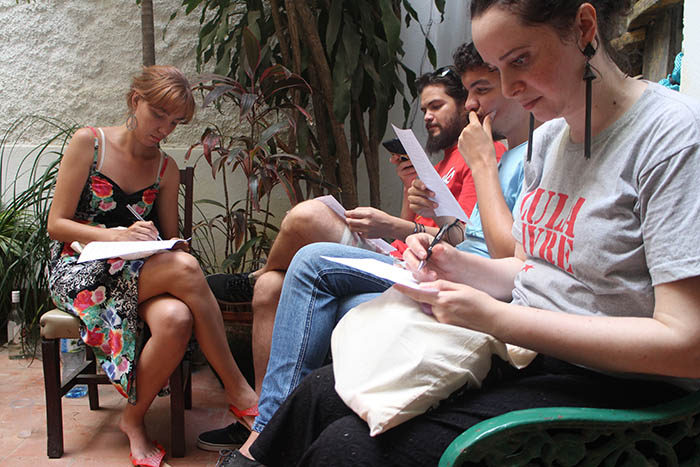
Government agents stalked the exhibitions while the organisers were accused of being in league with Cuba’s enemies. How does one respond to such accusations? “We responded by making an event that is as honest as possible, with a wide range of manifestations and artistic expressions that reflected the reality of Cuban art,” Nuñez Leyva says. “We responded with a list of more than 170 participants, not only Cubans, but from Mexico, Spain, Germany, the United States, Romania, Angola, Colombia, Denmark, Ukraine, Brazil, Venezuela, among them high-profile artists that Cuban institutions admire and collaborated with.”
The authorities even tried to prohibit the public from attending, sometimes successfully. Flyers and stickers were also confiscated. “But none of these actions were ever going to stop the energy of the event,” Otero Alcantara says.
“Despite all this pressure, the event went ahead, demonstrating that there is a group of people who are very courageous and have a real commitment culture,” Nuñez Leyva says. #00Bienal helped revive “a spirit of alternative rebellion” through the involvement of “countless numbers of totally unknown artists” that the state would never endorse.
For Otero Alcantara, the event’s success lies in the cohesion it created between artists, scholars and art enthusiasts, something that is unprecedented in the world of Cuban art. “We built an inclusive space of free creation and true collaboration between the people involved, exhibited the work of artists who were never going to have space in an official Havana Biennial and set a precedent for future projects,” he says. “This is one more step towards eliminating a fear that exists throughout Cuba.”
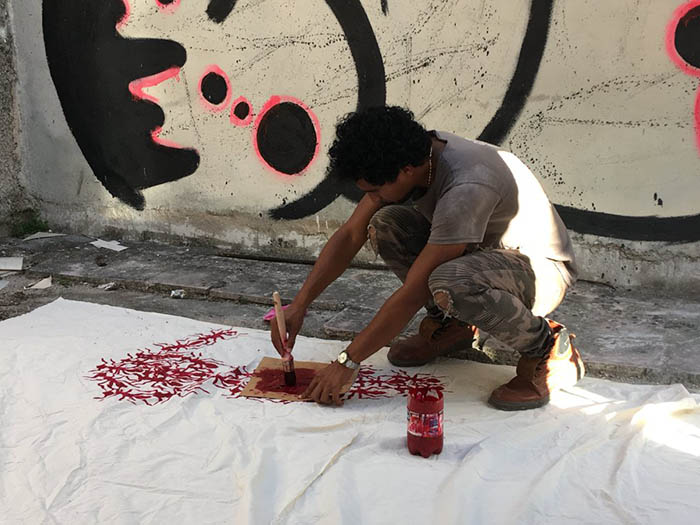
According to the organisers, the terms “revolution” or “revolutionary” have been hijacked and distorted by the Cuban regime. Such deformation has taken root so deep in the imagination of the Cuban people that just by mentioning the word “dissidence” is enough to be shunned, they explain.
“The #00Bienal was a humanistic project that brought to the fore essential values for any society such as unity, solidarity and collaboration,” Nuñez Leyva says. “The event also favoured the less privileged and created beauty and dialogue in favour of a new Cuba.”
The organisers of #00Bienal are under no illusions that life for Cuba’a dissident artists will magically become any easier under Cuba’s new president, Miguel Díaz‑Canel, who took over from Raúl Castro in April 2018. “The Cuban regime is more than any Castro,” Nuñez Leyva says. “It is a system based on a group of families that live both inside and outside the island, who have control over everything, which ultimately contributes to their own wealth.” This corrupt system relies on the deception of a people who have been left without even the strength even to protect themselves against poverty, she adds. “This situation leaves us with little hope, but we have to keep working.”
Otero Alcantara and Nuñez Leyva’s now want to show that #00Bienal wasn’t just a one-off, but is a serious project with longevity. “We will see if it is possible in two years to achieve something similar,” Otero Alcantara says.[/vc_column_text][/vc_column][/vc_row][vc_row][vc_column][vc_media_grid grid_id=”vc_gid:1528443291288-dfd45bff-0a16-7″ include=”100716,100712,100711,100710,100713,100709,100708,100707,100706,100704,100715,100705″][/vc_column][/vc_row][vc_row][vc_column][vc_column_text]
Artists, writers, musicians and theorists who took part in #00Bienal
Amaury Pacheco (Cuba), Iris Ruiz (Cuba), Coco Fusco (Cuba-USA), Tania Bruguera (Cuba), Reynier Leyva Novo (Cuba), Ernesto Oroza (Cuba), Gerardo Mosquera (Cuba), Katherine Bisquet (Cuba), Jose Ernesto Alonso, Yuri Obregón (Cuba), Alein Somonte (Cuba), Alejandro Barreras (Cuba), Anaeli Ibarra (Cuba), Alejandro Taquechel (Cuba), Ariel Maceo Tellez (Cuba), Aryam (Cuba), Aldeide Delgado (Cuba), Armando Cuspinera (Mexico), Antonio Mas (Spain), Alicia Torres (Spain), Ana Olema (Cuba), Alexis Ruiseco (Cuba-USA), Alexandru Raevschi (Germany), Andrés X (Cuba), Alain Aspiolea (Cuba), Alexandre Arrechea (Cuba), Antoni Muntadas (Spain), Biennial Project (USA), Boris González Arenas (Cuba), Colectivo Corason i uevo (Antonio A. Orta, Maykel Almenteros y Pedro Pablo Bacallao) (Cuba), Colectivo Guerrillas Girls, Celia y Yunior (Cuba), Colectivo 2.50 (Ana Gómez, Argelia Leodegarío, Marco Antonio Rodríguez, Itandehuitl Orta, Yuvia Pérez, Esmeralda Pérez) (Mexico), Carlos Manuel Álvarez (Cuba), Clara Astiasarán, Chu (Cuba), David de Omni, David León (Cuba), Danilo Maldonado (El Sexto), Diego Gil (Spain), Eliecer Jiménez Almeida (Cuba), Erish (Mexico), El Oficio (Cuba), Ernesto Hernandez Busto, Enfori García, Filipa César (Portugal), Fabián (2+2 =5) (Cuba), Francis Sánchez (Cuba), Francisco Méndez (Mexico), Francisco Masó (Cuba), Fabian Martínez, Filio Gálvez, Fredric Snitzer, Gabriel Coto (Cuba), Gerardo Stübing (España), Gean Moreno, Henri Eric Hernández (Cuba), Hamlet Lavastida (Cuba), Héctor Trujillo (Cuba), Hugo Patao, Italo Expósito (Cuba), Iván de la Nuez (Cuba), Jesús Hdez-Güero (Cuba), Jesús Benítez (Mexico), José Luis Marrero (Cuba), Josvan Gonzalez Agramonte (Cuba), Julián Yunda Yepes (Mexico), Jenifer Acuña (Cuba), Juan Melo (Colombia), Juan Carlos Alvarez Miranda (Cuba), Jean-Lorin Sterian (Romania), José Bedia (Cuba), Julio César Llopiz (Cuba), Javier Marimón, José Manuel Mesías (Cuba), Keyezua (Angola), Kevin Arrow, Lía Villares (Cuba), Luis Trápaga (Cuba), Luiso, Leandro Villanueva (Sam 33) (Cuba), Lester Dubé (Cuba), Lala Misosniky (Romania), La Alianza (Cuba), Liliam Dooley, Leandro Feal (Cuba), Lourdes Porrata, Miquel García (Spain), Marisol Maza (Mexico), Marcel Marquez (Cuba), Marianna Liosi (Germany), MO colectivo (Mariam Abrajim y Octavio Salazar) (Colombia), Magdiel Aspillaga, Mysora García, Nonardo Perea (Cuba), Natalia López (Colombia), Osmel Almaguer Delgado (Cuba), Osmany Carratalá (Cuba), Oscar Salamanca (Colombia), Orlando Hernández (Cuba), Pablo Pinto (Colombia), Polyanna Morgana (Brazil), Political Architecture: Critical Sustainability (PA:CS) (Denmark), Peter Menéndez, Rafael Carabano (Venezuela), Raúl Meriño (Cuba), Ras Yoe, Ricardo Figueredo, Rodolfo Peraza (Cuba), Rafael Domenech, Rirkrit Tiravanija, Svitlana Biedarieva (Ukraine), Soandry del Río (Cuba), Sandra Ceballos (Cuba), Santiago Alvarez Méndez (Colombia), Sandor (Cuba), Thiago Morandi (Brazil), Tomás Sánchez (Cuba), Tomas Vu, Tonel (Cuba), unx Pardo Ibarra (Colombia), Ulises Valdés (Mexico), Walfrido Valera (Cuba), Yaima Pardo (Cuba), Yasser Castellanos (Cuba), Yesica Suárez (Colombia), Yulier P. (Cuba), Yoenis Eloy Mayeta (Cuba), Yimi Konclase (Cuba), Yvelin Buenrostro (Mexico), Yucef Merhi (Venezuela), Yornel Martínez (Cuba), Yali Romagoza (Cuba), Yanier H. Palao (Cuba).[/vc_column_text][/vc_column][/vc_row][vc_row][vc_column][vc_basic_grid post_type=”post” max_items=”4″ element_width=”6″ grid_id=”vc_gid:1528443291296-0ad2c295-a239-7″ taxonomies=”104″][/vc_column][/vc_row]
4 Jun 2018 | Artistic Freedom, Europe and Central Asia, News and features, Risks, Rights and Reputations, United Kingdom
[vc_row][vc_column][vc_column_text]
On Saturday 24 March the final performance of my play Elephant was cancelled in Birmingham, bizarrely the same city where, just over 13 years ago, my play Behzti was closed after protests against the show turned violent. Last month, a different kind of protest brought the run of Elephant to its premature end. The Football Lads Alliance were in town, apparently marching against “extremism” on the same day as the play’s final outing.
Elephant had completed a run in the Birmingham Rep’s studio space, The Door, and was on tour in the community. The last performance was for a closed group of visually impaired adults from a local charity and was scheduled to go on at the Old Joint Stock, a pub theatre in the city centre. However, because of the FLA demonstration, many local pubs, including the Old Joint Stock, which happened to be near the focal point of the rally, closed, following police advice.
The Rep found another location for the show, a large room at the theatre, but the charity did not feel safe bringing their group across town, such was the atmosphere of trepidation surrounding the march. With no audience, there was to be no show.
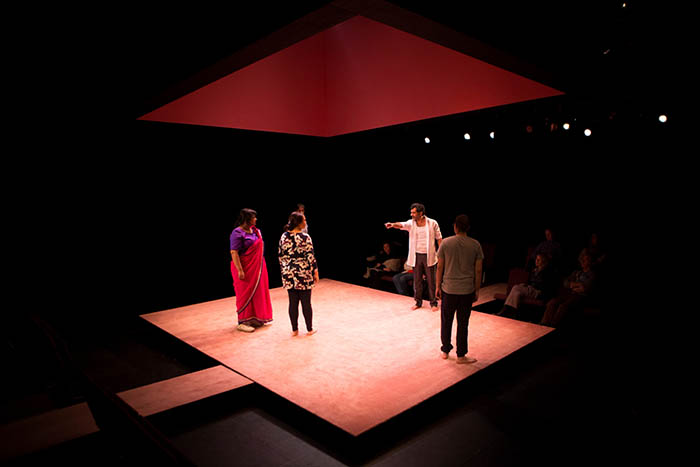
The cast of Elephant. Credit: Ellie Kurttz
Elephant was certainly not targeted like Behzti, it was simply collateral damage, as were the many businesses who lost significant income and the thousands of ordinary people who were intending to come into town to work and play in their city, but ended up changing their plans.
The FLA marching in Birmingham, a city defined by multiculturalism, was clearly an act of provocation. Everyone has a right to protest but the question here is about the policing of such action. The police facilitated the FLA and their cohort, most of whom came from outside the West Midlands, protecting their freedom to express their views. Afterwards the police framed the march as a success and Birmingham West Chief Superintendent Danny Long thanked the public for their understanding, saying: “Our aim was to facilitate the lawful protest and lawful assembly of all the groups here and that’s what’s happened.” Words which show little regard for the lawful freedoms of local people.
The clear message given out by the police was one of fear – keep a low profile and stay away, because today this is not your city. It’s a dysfunctional way of keeping order, one that we’ve got used to and don’t question. Peddling this type of fear gives credence to abhorrent views and fuels underlying tensions.
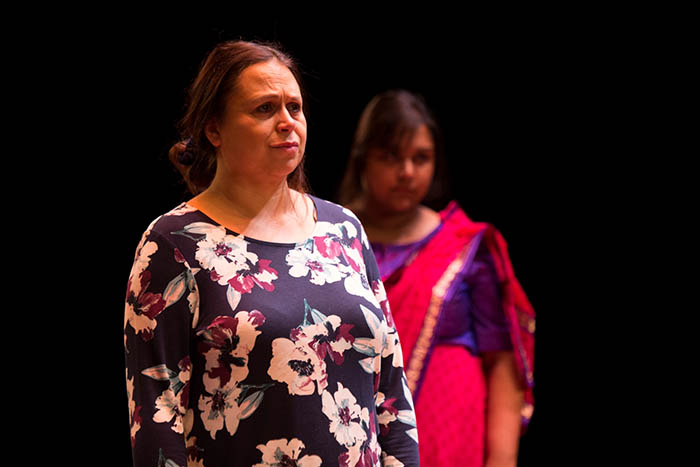
Yasmin Wilde as Deesh in Elephant. Credit: Ellie Kurttz
The West Midlands police have considerable form. Five years after Behzti was cancelled (the main reason being that because the police said they could not guarantee the safety of staff or public), Penny Woolcock’s film 1Day was removed from Birmingham cinemas after the same police force suggested it might incite gang violence. In 2010, during rehearsals of my play Behud, the police asked the Coventry Belgrade to pull the production, as they were expecting protests. The theatre refused and the show continued without incident.
Each of these situations tells us more about the police’s anxieties than our own. Given their attitude around the FLA march, there is clearly still much to learn about managing order in a city where almost half the population do not identify as white British. In her speech at the demonstration, the leader of far-right organisation For Britain, said: “We are living through a dark time in this country.” It’s a dark time indeed when the freedoms of racists brought in to intimidate and frighten a community, trump the freedoms of that very community to live their lives.
What happened in Birmingham last month raises questions of power and control. Who runs our cities and who are they for? The FLA march left a trace of unease and fracture in a city where many of its inhabitants already feel marginalised.
Elephant tells the story of a woman who is ostracised for telling the truth about being abused as a child. Although the circumstances of the play’s cancellation were totally different to Behzti in 2004, it’s hard not to feel a similar sense of sadness and loss at having been silenced.
Facilitating an inflammatory protest at the expense of the freedoms of the silent majority is no victory and shutting people out of their own city is no fit way of dealing with tensions between communities. Public order should be maintained in a fair and equal way, otherwise those who shout loudest get heard, and everyone else ends up without a voice.[/vc_column_text][vc_column_text]
ALSO READ
[/vc_column_text][/vc_column][/vc_row][vc_row][vc_column width=”1/3″][staff name=”Gurpreet Kaur Bhatti on Behzti” profile_image=”100618″]When I started writing my third play, Behzti, in 2003 I could never have imagined the furore which was going to erupt. There was an atmosphere of great tension in the lead up to its production in December 2004, and it was indeed an extraordinary time. Mass demonstrations culminated in a riot outside the theatre. Read on[/staff][/vc_column][vc_column width=”1/3″][staff name=”Birmingham Repertory Theatre: Behzti” profile_image=”100620″]In December of 2004, Birmingham Repertory Theatre staged the world premiere of Behzti, a new play by Gurpreet Kaur Bhatti, in the smaller of its two theatres, The Door, which is a space exclusively dedicated to the production and presentation of new plays. “Behzti” is a word in common usage amongst the Punjabi speaking community meaning “dishonour” or “shame”. Read on[/staff][/vc_column][vc_column width=”1/3″][staff name=”Challenging the UK’s risk averse culture” profile_image=”100621″]It’s easy to dismiss the importance of arts in a democracy; its social value is disregarded when it is seen as the province of the rich and privileged. Yet when we look to more authoritarian regimes across the globe Index is reminded constantly of the importance of the role of arts as a voice of dissent and the extraordinary amount of time that repressive states spend suppressing it. Read on[/staff][/vc_column][/vc_row]







